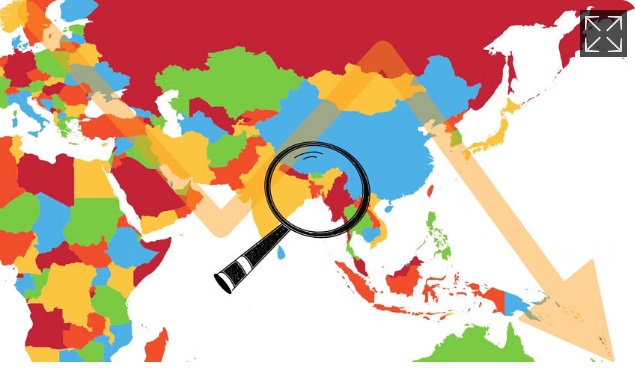How Bangladesh can navigate the geopolitical crossroads
Selim Jahan | Source : The Daily Star, 19 February 2025

In recent times, the geopolitical landscape of the world has changed quite fast. The Ukraine war a few years ago, followed by the Israel-Palestine conflict, and the rise of right-wing governments in different European countries have changed the geopolitical panorama a lot. The ouster of Bashar al-Assad in Syria and that of Sheikh Hasina in Bangladesh have also added new dynamics at least to the respective regional geopolitics. Very recently, the election of Donald Trump as the newest US president has also added a lot to the changing scenario. Undoubtedly, the world is now at a geopolitical crossroads. One may wonder: what are the implications of all these for Bangladesh? In this context, some observations may be pertinent.
First, traditionally, the term "geopolitics" has a specific connotation. This concept has a "geographical" dimension as well as "political." But it must also be recognised that economic interests remain behind it as an important aspect. In fact, most of the time, economic interests of nations drive the global geopolitical dynamic. Since geopolitical phenomena reflect international relations, it is obvious that one of these relations would be economic. The bottom line is, it is wrong to keep the geopolitical concerns only to the arenas of geography and politics; it is necessary to recognise that "geoeconomics" and "political economy" of nations are equally crucial in the broader context of geopolitics.
How do all of these affect Bangladesh? First of all, economic nationalism would affect its external trade, as well as the aid and foreign investment flows into the country. The trading partners will be more inward-looking, as a result of which some of the benefits that Bangladesh used to enjoy may no longer be available. The country may face higher tariffs and non-tariff barriers from its trading partners. Similarly, aid and foreign investment flows into the Bangladesh economy may be reduced. All these will impact the growth prospect of the country, adversely affecting job creation and employment in the economy.
Second, in a changed geopolitical structure, multilateralism is gradually taking a back seat and bilateral approaches are getting preferences. It means that external aid, particularly grants, will be negotiated bilaterally, rather than on multilateral platforms. It also implies that political concerns like water-sharing, cross-border migration and environmental issues, which sometimes are related to more than one nation, are probably going to be addressed between two nations, rather than by multiple nations. Thus, Bangladesh may have to deal with the flood issues separately with India and Nepal, rather than jointly with those countries. Similarly, there may not be a regional approach to the Rohingya crisis and different environmental issues that concern more than one country. All these may impact the regional public goods scenario in South Asia.
Third, in the new geopolitical order, there will be disparities in global economic opportunities. It will be important for Bangladesh to seize them. For example, the digital revolution around the world would provide numerous openings for Bangladeshi youths and entrepreneurs. The challenge would be whether Bangladesh is prepared in terms of educational standards, skill sets, and human resource development. This is crucial as some of the other countries would be moving faster than Bangladesh. At the same time, the country will have to be aware of the global risks, which may range from economic recession to some pandemics. Given the differences in the state of development, the countries will neither be equally prepared nor equally equipped to overcome the risks. Bangladesh needs forward planning to remain ahead of the game.
Fourth, one of the major milestones that Bangladesh will have to pass in its development process is its graduation from the LDC (Least Developed Country) status in 2026. The event is prestigious. Graduating from the LDC status will boost the nation's morale and aspire the people to reach a higher goal. But at the same time, such a graduation entails some challenges. For example, with the graduation, Bangladesh may lose its preferential treatment status in international trade; it may no longer be a candidate for grants from multilateral organisations. The changed global geopolitical structure may impact the LDC graduation scenario of Bangladesh. The country must be planning ahead of time to address the issues associated with the LDC graduation.
Finally, in the changed geopolitical scenario, it is not only global institutions but also regional groupings that are becoming relevant and effective. Yes, the South Asian Association for Regional Cooperation (SAARC) exists, but it needs strengthening and must be made more effective. It can be a useful platform for regional negotiations and decision-making. However, Bangladesh must look beyond SAARC. It should explore how it can be linked to platforms such as G15, G20, and BRICS (Brazil, Russia, India, China, and South Africa). Bangladesh should also use the platform of South-South cooperation to get the best out of the changed global geopolitical situation.
Selim Jahan is former director of the Human Development Report Office under the United Nations Development Programme and lead author of the Human Development Report.